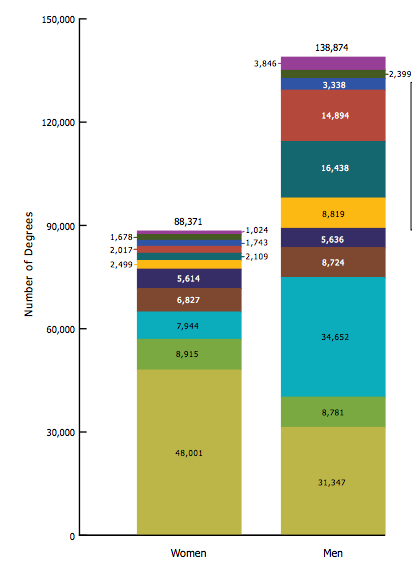Forgive my self-indulgence on this snowy Friday. My younger daughter Emily is a second-year chemistry and physics teacher at City On A Hill Charter School on Circuit Street in Boston. The students at COAH are 98% minority and 83% low-income. Twenty-four percent are eligible for special education services and 10% are English Language Learners. Student outcomes are stellar; for example, 91% of COAH students scored proficient or advanced proficient in tenth-grade language arts on Massachusetts’ Common Core-aligned standardized assessments and 81% were proficient or advanced proficient in math.
On Wednesday, in honor of International Women’s Day, Emily switched it up a bit in her physics classes and taught a lesson called “Data on Girls in STEM Classes." Students were presented with a series of graphs on gender differences in STEM fields. Here’s an example:
Figure 4: Bachelor’s Degrees Earned in Selected Science and Engineering Fields, by Gender, 2007

After analysis and discussion of the graphs, the class read an article called “Are Women Worse at Math? It’s Time to Stop Asking,” followed by this writing prompt:
Reflect: Below, propose one specific step our school, community, or policymakers could take to address the issues facing women and girls in STEM. Why did you choose it? Why is it important?
Here are some student responses:
Start one commercial campaign that demonstrates the excellence that girls can do and how successful they can be. This will fill growing girls with self-esteem to become something greater and achieve more than men.
Schools can take one day to talk about women and their struggles. Educating everyone about women and coming up with alternatives to better women’s futures. It’s important because women are just as important as men.
We could have meetings with the women to talk about the issues going on in society and try to take a stand.
An idea I have for my school and community is that they should offer more video game-related classes and fields , specifically for women and girls. In the gaming industry it is male-dominated; there’s the stereotype that video games are a male thing. I find that false because there are girls who love video games, like me. I’m referring to girls who are actually gamers. It’s important because there are very few female game developers , designers, programmers, artists, audioists, managers, etc. I know that there are girls like me who want to be in the gaming industry.
I'd be remiss to not point out that Massachusetts suburbanites voted down a proposition in November that would have permitted Boston to add twelve new charter schools, a demonstrated need because currently 34,000 Boston students are sitting on charter school waiting lists. You can thank teacher union president Barbara Madeloni for the state's rejection of Prop 2. Meanwhile, I'm thankful to have a daughter like Emily.Labels: Massachusetts, Public Charter Schools, STEM